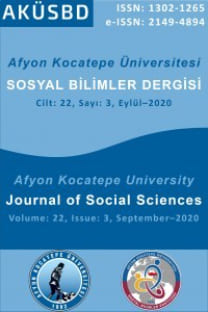Akıllı Kent Konusunda Yazılmış Lisansüstü Tezlere Dair Bibliyografya Çalışması (2012-2020)
Bibliography of Graduate Theses Written on Smart City (2012-2020)
___
- Aina, Y. A. (2017). Achieving smart sustainable cities with GeoICT support: The Saudi evolving smart cities. Cities, 71, 49-58. doi: /10.1016/j.cities.2017.07.007
- Al Sharif, R., & Pokharel, S. (2021). Smart City Dimensions and Associated Risks: Review of literature. Sustainable Cities and Society, 103542.
- Allen, B., Tamindael, L. E., Bickerton, S. H., & Cho, W. (2020). Does citizen coproduction lead to better urban services in smart cities projects? An empirical study on e-participation in a mobile big data platform. Government Information Quarterly, 37(1), doi: 101412. 10.1016/j.giq.2019.101412
- Caragliu, A., Del Bo, C., & Nijkamp, P. (2011). Smart cities in Europe. Journal of urban technology, 18(2), 65-82. doi: 10.1080/10630732.2011.601117.
- Dünya Bankası. (2010). Cities and Climate Change: An Urgent Agenda. Urban development series, Washington, DC.
- Erdoğan, O. (2020). Akıllı kent üzerine yazılan lisansüstü tezlerin içerik analizi. Atatürk Üniversitesi Sosyal Bilimler Enstitüsü Dergisi, 24 (2), 917-937.
- Guzzo, R. A., Jackson, S. E., & Katzell, R. A. (1987). Meta-analysis analysis. Research in organizational behavior, 9(1), 407-442.
- Gül, H., & Kemeç, A. (2020). nesnelerin interneti ve kamu politikaları: kentsel politika uygulamaları. C. Babaoğlu ve M. Yıldız (Ed) Teknoloji ve Kamu Politikaları içinde (ss. 139-167). Ankara: Gazi Kitabevi.
- Kemeç, A. (2021). Akıllı Kent Uygulamaları: Antalya Büyükşehir Belediyesi Örneği, (Doktora tezi), Süleyman Demirel Üniversitesi, Isparta.
- Kim, J. (2022). Smart city trends: A focus on 5 countries and 15 companies. Cities, 123, 103551.
- King, W. R., & He, J. (2005). Understanding the role and methods of meta-analysis in IS research. Communications of the Association for Information Systems, 16, 665-686. doi: 10.17705/1CAIS.01632
- Kumar, N. M., Goel, S., & Mallick, P. K. (2018). Smart cities in India: Features, policies, current status, and challenges. In 2018 Technologies for Smart-City Energy Security and Power (ICSESP) (1-4). IEEE. doi: 10.1109/ICSESP.2018.8376669
- Lim, C., Cho, G. H., & Kim, J. (2021). Understanding the linkages of smart-city technologies and applications: Key lessons from a text mining approach and a call for future research. Technological Forecasting and Social Change, 170, 120893. doi: 10.1016/j.techfore.2021.120893
- Marsal-Llacuna, M. L. (2020). The people's smart city dashboard (PSCD): Delivering on community-led governance with blockchain. Technological Forecasting and Social Change, 158, 120150.doi: 10.1016/j.techfore.2020.120150
- Osman, A. M. S. (2019). A novel big data analytics framework for smart cities. Future Generation Computer Systems, 91, 620-633.doi: 10.1016/j.future.2018.06.046
- Rani, S., & Kumar, R. (2022). Bibliometric review of actuators: Key automation technology in a smart city framework. Materials Today: Proceedings.
- Sadioğlu, U. &, Dinç, B. (2019). Yaşam boyu öğrenme ve akıllı kentler. Kamu Yönetimi ve Teknoloji Dergisi, 1(1), 63-88.
- Vince, C., & Morrissey, J. (2020). 5 focal points needed to develop a smart city. https://www.smartcitiesdive.com/news/5-focal-points-needed-to-develop-a-smart-city/580023/ (Erişim tarihi: 14.11.2021).
- ISSN: 1302-1265
- Yayın Aralığı: 4
- Başlangıç: 1999
- Yayıncı: Afyon Kocatepe Üniversitesi Sosyal Bilimler Enstitüsü
Vesîletü’n-Necât’ta Seslenme Sözleri
Kamu Harcamaları ile Ekonomik Büyüme Arasındaki İlişkinin Analizi: Türkiye Örneği
Finansal Açıklık, Dışa Açıklık ve Ekonomik Büyüme: Türkiye Üzerine Ampirik Bir Uygulama
Ortaokul Matematik Öğretmenlerinin Oran-Orantı Konusuyla İlgili Alan Bilgilerinin İncelenmesi
Ayşe Betül DOĞRUEL, Fatih KARAKUŞ
Geçmişten Günümüze Okul Müdürlüğü: Okul Müdürlerinin Metaforik Algıları
Pandemi Sürecinde Sağlık Kaygısının Boylamsal İncelenmesi ve Yaşam Doyumu ile İlişkisi
Müzik Performans Kaygısı Alanında Yapılan Araştırmaların Türkiye Ölçeğinde İncelenmesi
Zafer KURTASLAN, Muhsin SARIKAYA, Ender Can DÖNMEZ, Volkan Burak KİBİCİ
Ahmet Selçuk BAYBURTLU, Duygu ULUSOY YILMAZ
Yatırım Bankaları Hisse Senedi Değerleri ve Tahvil Faizlerine Yönelik İlişki Düzey Analizi
